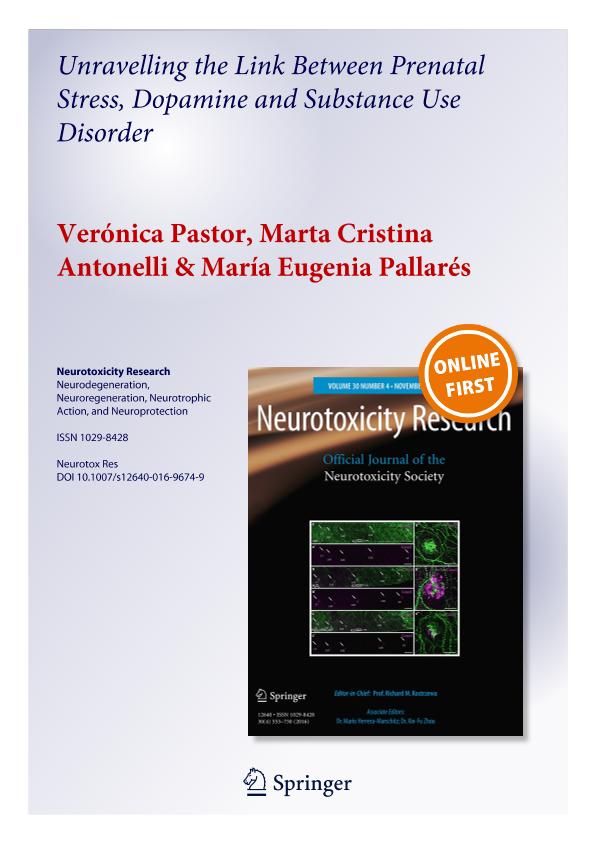Artículo
Unravelling the Link Between Prenatal Stress, Dopamine and Substance Use Disorder
Fecha de publicación:
10/2016
Editorial:
Springer
Revista:
Neurotoxicity Research
ISSN:
1029-8428
Idioma:
Inglés
Tipo de recurso:
Artículo publicado
Clasificación temática:
Resumen
Substance use disorder (SUD) refers to the detrimental use of psychoactive substances and it is related to a cluster of behavioural, cognitive and physiological dysfunctions indicating that the individual continues using the substance despite significant substance-related problems. Although it is one of the most prevalent neuropsychiatric diseases affecting society worldwide, the mechanism underlying the vulnerability of certain individuals is not well understood yet. It is now widely accepted that, in addition to genetic factors, environmental adversities during critical stages of development of an organism could also be considered as risk factors that contribute to SUD. It has been suggested that prenatal stress (PS) could play an important role in the causal mechanisms of SUD, since it was shown that PS leads individuals to poor stress management and behavioural problems, both of which increase the risk of SUD. It is widely accepted that gestational stress exposure in rats interferes with the correct progeny development. In particular, research in this field points out that the development of the mesocorticolimbic dopaminergic (DA) system is sensitive to disruption by exposure to early stressors. Interestingly, PS induces behavioural abnormalities that are similar to those observed in individuals that present SUD. Since dysfunction of mesocorticolimbic DA pathway has been reported in both prenatally stressed and SUD individuals, in this review we will summarise the current knowledge supporting that PS may serve as a strong candidate to explain the vulnerability of certain individuals to develop SUD following repeated drug exposure. We will also propose a mechanistic hypothesis to explain PS-induced changes on mesocorticolimbic DA system.
Archivos asociados
Licencia
Identificadores
Colecciones
Articulos(IBCN)
Articulos de INST.DE BIOLO.CEL.Y NEURCS."PROF.E.DE ROBERTIS"
Articulos de INST.DE BIOLO.CEL.Y NEURCS."PROF.E.DE ROBERTIS"
Citación
Pastor, Verónica; Antonelli, Marta Cristina; Pallares, Maria Eugenia; Unravelling the Link Between Prenatal Stress, Dopamine and Substance Use Disorder; Springer; Neurotoxicity Research; 31; 1; 10-2016; 169-186
Compartir
Altmétricas




